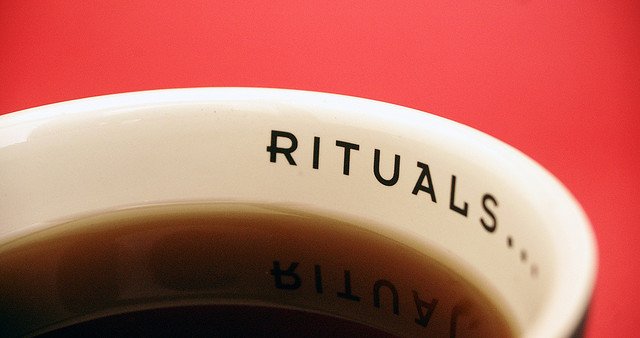On routines and rituals.

I’m a great believer in routines.
I’m a believer in them because I think that innovation is predicated upon standardisation. In other words, routines afford us the spare capacity to think about things other than (repetitive) tasks at hand.
Routines provide spare capacity by removing, or narrowing, choice.
Take my morning routine, for example. Granted, having children means that no two are identical, but every day I’m at work in the office at JISC infoNet Towers, I do the following:
- Have a cold shower
- Eat eggs (either scrambled on toast or an omelette)
- Listen to the same ‘Train’ and ‘Walking’ playlists via Spotify (albeit on random)
- Read Baltasar Gracian’s The Art of Worldly Wisdom on the train
Of course, it’s not necessary to have to undergo a commute to have routines. They’re just things you do at the same time and/or place.
So far, so obvious.
Routines gain power by becoming rituals. For example, there’s something about the first cup of coffee in the morning. It has a ritualistic element; it symbolises waking and the liminal space between home and work.
Whilst routines are easy to create and maintain on an individual level, rituals are slightly trickier. This, I believe, is because rituals involve gathering. It may be people who are gathered together, it may be thoughts. Rituals pull together and coalesce disparate elements.
Organisations and educational institutions are extremely well-placed to turn individual productive routines into collective rituals. One of the best places to start is often around food. At JISC infoNet we have a weekly Cake Club: the cake serves as a convenient hypocrisy for a kind of gathering we otherwise would not necessarily experience.
What kind of routines could you or your organisation turn into rituals?
Image CC BY visualpanic

It’s unwanted choice that is the problem, I’m sure you would agree. But how important it is to allow people the freedom to choose the rituals and routines that serve them well. If imposed on others, rituals or routines can be the bane of people’s lives; if freely chosen, a blessing. There’s a paradox for you…
Simon
Hi Simon, thanks for the comment. 🙂
I’m not sure it’s as binary, black/white as you suggest. I’ve seen examples of fairly rigorous and inflexible routines being imposed on people in organisations which they hate at first. After a while, everyone being on the same page leads to creativity blooming.
For a prosaic example, look at the ‘routine’ of forming 140 character tweets. Constraints can fuel creativity!
I’m totally with you on the power of routines; in fact I wrote a blog post on this very topic last week. I’m always saying to school leaders that running a school or a classroom is a very complex thing, but there are easy wins. Routines is one of them. (Noted Simon, that too many or the wrong ones can have the opposite effect.)
I’m interested too, in how and why routines becomes rituals. I agree with the gathering element but this wouldn’t explain your first cup of coffee ritual; well, not if you are alone whilst drinking it. I think it has something to do with mindfulness. If you simply drink your coffee every morning, unthinkingly and without engaging in the experience, it is simply a routine. When you drink your coffee and enjoy it mindfully however, smelling the aroma and enjoying the taste and the transition, it might be then that it becomes a ritual.
This is one way I’ve changed my running from routine to ritual. I leave my headphones at home and concentrate. It’s not something I just do, automatically. It’s something I start automatically but am then mindful when I do it. I now like my running much more than when it was just a routine.
An example for a collective ritual that I recognised after reading your post is family meal times. When I eat with my family around the meal table, it could easily be a routine if we just sit and eat. When we ask about the best bits of our day and what we had for lunch, when we discuss plans for the weekend and for holidays then it becomes a ritual, just like your Cake Club.
Thanks for making me think about it.
(BTW, I think you broke the first rule of Cake Club.)
Absolutely. A ritual is just a routine if there’s no gathering.
(and yes, several people have said that about Cake Club…) 😉